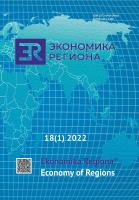Оценка адаптации населения регионов России к цифровым технологиям
Assessing the Adaptation of the Population of Russian Regions to Digital Technologies
Author(s): Svetlana Victorovna Doroshenko, Mariya Nikitichna MakarovaSubject(s): Economy, Gender Studies, Demography and human biology, ICT Information and Communications Technologies, Socio-Economic Research
Published by: Институт экономики Уральского отделения Российской академии наук
Keywords: adaptation; population; digital technologies; regions; demographic factors; gender; place of residence; barriers; restrictions; econometric analysis;
Summary/Abstract: Currently, digitalisation of public life is one of the most important external challenges that requires active adaptation of the population to new realities. Russia has been quite successfully implementing digital technologies, ranking in the middle of various world ratings. However, Russian regions significantly differ in terms of the population adaptation to digital technologies. We hypothesise that adaptation speed depends on demographic characteristics of the regional population. In this regard, the paper aims to develop a methodology and tools for assessing the adaptation of the population of Russian regions to digital technologies. The study employs data of a sample observation on the state of the information society in 2014–2020 obtained from the Federal State Statistics Service. Methods of statistical, cartographic, factor and regression analysis, as well as the econometric estimates conducted in the R software environment were used. Constructed econometric models show that gender and place of residence (urban or rural settlement) are the most important adaptation factors in Russian regions. In particular, urban women more actively use the Internet for shopping, while urban women and rural men use it to receive public services. Active acquisition of digital competencies by the population reduces the importance of some barrier factors (restrictions), such as the cost of connection (Internet connection becomes a basic need) and the lack of skills. While the identified effects differ in magnitude, they are significant for almost all Russian regions. The developed research methodology can be applied in future studies to analyse other aspects of social and economic adaptation of the regional population to current challenges. The findings can be used for justifying and implementing the public policy measures, in particular, the national project “Digital Economy”.
Journal: Экономика региона
- Issue Year: 18/2022
- Issue No: 1
- Page Range: 296-310
- Page Count: 15
- Language: Russian

